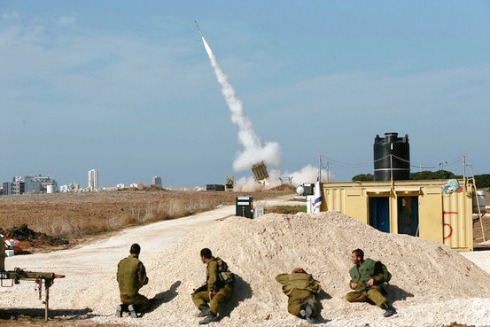Archives
AND MORE...

RUSSIA Means What It Says
_____________________

Stunners & Bummers
_____________________

'Discover Russia'
_____________________

Our Whisperer-in-Chief
_____________________
March 1, 2013
Lessons From "Iron Dome"
Our own General Obering (General Obering is one of NSR's distinguished Senior Advisors) indeed "wowed the crowd," when he spoke at an NSR event on February 6th about US missile defense and the lessons learned from Israel's Iron Dome experience (see below).
IsraelNationalNews.com | February 28, 2013
Lt. Gen. Obering: Iron Dome's Lessons Learned
Former head of U.S. Missile Defense Agency analyzes the elements that turned Iron Dome into a success story.
By Mark Langfan

Israeli soldiers, above, watched the launch of an Iron Dome antimissile weapon designed to blast Hamas rockets out of the air. Photo: Reuters; Courtesy: WSJ.com
In a wide-ranging power-point analysis briefing given to The National Security Roundtable this week, US Lt. Gen. Henry “Trey” Obering (Ret.), who led the US Missile Defense Agency during the mission-critical years of Iron Dome from 2004 to 2009, boiled down the “Lessons Learned” of Iron Dome experience to 5 keys.
He set the stage for his Lessons Learned analysis by asking the audience “What would America have done if 25% of its population or 50,000,000 Americans were under Grad rocket assault by a bunch of Islamist Terrorists?" (The full PowerPoint or just the “Lessons Learned” slide are available for viewing).
Gen. Trey Obering’s five keys for success were:
1. Mission Vision
He said President Ronald Reagan’s Strategic Defense Initiative (SDI) wasn’t a sci-fi fantasy, but an out-of-the-box vision of where the future of defense should be. Israeli defense officials, like Yitzhak Rabin, shared President Reagan’s vision from early on. This tradition continued with Israeli defense planners like Brig. Gen. Daniel Gold and missile defense developers like Arieh Herzog. This vision and collaboration resulted in the critically important missile defense programs both nations have today. (For a riveting account of Iron Dome’s early hurdles see the Wall Street Journal article Israel's Iron Dome Defense Battled to Get Off Ground).
2. Perseverance through Technical Difficulty
Gen. Obering explained that with any new technology there will be test failures. Today’s effective US sea-based and land-based interceptors suffered early failures, then strings of successes. Likewise, the Arrow program failed in its early flights, then succeeded in a series of intercepts. Israel funded the Iron Dome program through the earliest stages despite US military planners' doubts and set-backs.
3. Courage of Leadership
Iron Dome and Arrow both faced withering attacks from naysayers like the MIT Professor Theodore Postol who testified that the “Patriot’s intercept rate could be much lower than ten percent and maybe even zero,” and the Jaffe Center’s missile defense program critic Reuven Pedatzur who, as recently as 2010, with supreme confidence stated “The Iron Dome is all a scam,” see Jerusalem Post article 'Iron Dome doesn’t answer threats'.
But heroes, like Israeli Brig. Gen Daniel Gold, stayed the course, stuck to their knitting, and got the job done.
Obering quipped, “For every MIT professor who said ‘It couldn’t be done,’ I had 10 MIT young geniuses who were making the scientifically impossible, possible.”
4. Program Management
Gen. Obering emphasized that for a technologically game-changing defense program to be successful, the managers had to have “freedom of maneuver” in the allocation of resources to meet the fast moving day-to-day challenges. He explained that unlike usual defense programs, he had relief from the classic acquisition regulations and directives. Likewise, Gen. Gold established programmatic freedom to act in the Israeli program. The streamlined program oversight was the key to success.
5. Policy Considerations
Gen. Obering stated that the Iron Dome, and defensive systems like it, are game-changers that have to be pursued with supreme effort. He explained that the naysayers just looked at the “cost” in the cost/benefit analysis. He clarified that as a “policy consideration” defense rockets “cost” is not just measured in money, and that it is critically important to factor in the benefit of not having civilian assets destroyed – or of having to reinvade the territory with the consequent loss of Israeli soldiers lives – and of enabling the defenders time and space to react appropriately. Also, there is the missile defense deterrence factor in that the enemy has to effect a dramatically greater offensive attack profile before it attacks in the first place. Therefore, the risk/reward ratio for the enemy attacker is so changed that it is dramatically less likely to attack in the first place.
During the Q & A, Gen. Obering wowed the crowd with a live action video of an actual US missile defense early “kill” against an errant satellite.
Given the profound military and policy analysis of Gen. Obering and his critical hands-on assistance to Iron Dome project at its most sensitive and problematic stages, it was clear that Gen. Obering is not only an American true hero, but an Israeli hero as well.
Original article here.
Log In »
Notable Quotables
"Mr. Netanyahu is one of the most media-savvy politicians on the planet. On Friday he appeared live via video link on 'Real Time with Bill Maher,' taking the host’s alternately sardonic and serious line of questioning with gazelle-like alacrity."
~ Anthony Grant, jourrnalist who has written for many major newspapers and worked in television at Paris and Tel Aviv, interviewing former PM Benjamin Netanyahu on Monday, at the outset of Mr. Netanyahu's new book (more here).


